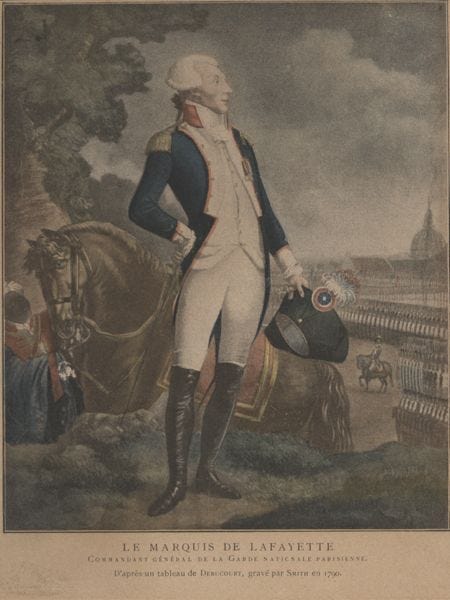Thoughts on Gonzague Saint Bris's "Lafayette." (2006)
Book Thoughts: Atlantic World History; French History; American History; 18th-19th Century; Popular Press Book
Gonzague Saint Bris, trans. George Holoch, Lafayette: Hero of the American Revolution (New York: Pegasus Books, 2010, org. 2006). Pgs. 354.

One of the greatest ironies of the 18th century is the reversal of American opinion regarding the French. From 1700 through 1763 (and one could argue until the start of the Revolution in 1775), the French were the arch-nemesis of Americans. The French were every thing that the British believed that they were not. The French were poorer, more inclined to superstition, papist, and generally more barbaric. Their government was tyrannical and her people to naieve to tell that they were under oppression. In America, the French represented the combining of the worst of Europe with the worst of the American continent. The French launched waves of attacks from Canada, threatening the stability and peace of the American colonies. Not only that, but they unleashed their Native American allies, in the minds of Americans, upon unsuspecting settlers. It was one thing to attempt to conquer the colonies in a traditional European manner, it was quite another to do so with armies of Native Americans. In sum, the French were antithesis of Britain. However, during the war of American Independence, and following the war, far more of the American populace came to believe the French were not only allies, but also friends and brothers in a common cause of liberty. So radical a transformation cannot be laid at the feet of anyone man. However, it would disengenious to say that one Frenchman in particular did not have an outsized influence. The Marquis de Lafayette set himself as a giant during the Age of Revolutions. Grappling with this giant’s influence has been done by numerous historians and in 2006 was once again tackled by novelest, biographer and historian Gonzague Saint Bris.
Bris is not a traditional historian. The book is devoid of the endless footnotes or endnotes that comprise a historian’s work. This perhaps makes it more approachable to the average reader, however in so doing the author is rootless in his text. Without the roots of definite sources, the text is unable to be more deeply examined and critiqued, or to be fully trusted. This is one fundamental flaw with the text, which is more the pity since the text contains fascinating antidotes, legends, and statements. This is perhaps why the book has received little notice in the academic world. It is a popular press piece and as such many historians will perhaps find little of value in the book.
Yet, can something be learned? Can something lacking the academic rigor desired by historians still have value to the field? In this I answer yes. While certainly the book lacks academic rigor, it reads like a haunting melancholic melody. The book is almost less a memoir of Lafayette than it is a memoir of the tragedy of France in the Age of Revolutions. Bris delves into the blackness of Bourbon France; the balls, the affairs, the mirth, the wanton extranvagence. He ties Lafayette to this world delicately, connecting Lafayette’s affairs and hunger for fame to the world he grew up in. Bris is unafraid to play the sad melody of a lost era, of what might have been. His book is disjointed at times, as many reviewers have noted, but this adds to the haunting melody. Unhindered by academic’s aversion to “great-man” history, Bris captures a truly remarkable life that had lasting and dynamic impacts. Lafayette in Bris’s writing is indeed a hero of liberty, but one that is complicated and human.
My initial reaction as a trained historian was raised eyebrows. The book lacks much in terms of an excellent biography or suitable history. But, upon reflection, that is not the point of this book. It is meant to engage the reader and bring them back to a world lost. In this it has virtues that academic texts may lack. The haunting melody of the French Revolution is well played in the book, as is the rugged road of reform. I would not recommend the text as a go to source on Lafayette. But, I can suggest that to broaden one’s perspective, to better hear the tune of the tragic revolution the author weaves so well into the story, pick up the book and read. In a world rife with modern Jacobins and revolutionaries, perhaps it is well to remember that the revolution lost so much as it burned its way through France. Equally so, it has the potential to remind readers of the delicate balance it takes to reform without the complete destruction of the whole. No where is the old lavishly praised. But did it have to die the death by fire? Was there a better, more peaceful road that was not taken. We will not know in this life, but the thought can give pause to our actions today.



